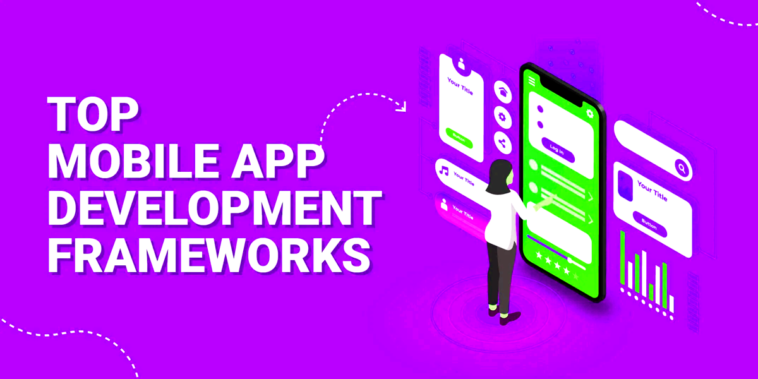Mobile app development has become a cornerstone of the digital landscape, with businesses and individuals relying on innovative and user-friendly applications to meet their needs. In the ever-evolving realm of app development, choosing the right framework is paramount to the success of your project. In this article, we will explore the top mobile app development frameworks to consider in 2024, providing insights into their features, advantages, and suitability for various projects.
Top Mobile App Development Frameworks To Consider In 2024?
Table of Contents
Why Choose the Right Framework?
Selecting the appropriate mobile app development framework is not just a technical decision; it profoundly influences the overall success of your app. The choice of framework impacts crucial aspects such as app performance, scalability, and the overall user experience. A well-chosen framework ensures that your app remains competitive, adaptable, and meets the expectations of modern users.
Read More : Nurturing a Culture of Open Communication in Remote Engineering Teams
Trends in Mobile App Development
Before delving into specific frameworks, let’s take a moment to understand the prevailing trends shaping the mobile app development landscape in 2024. Cross-platform development has gained significant traction, allowing developers to create applications that seamlessly run on multiple operating systems. Additionally, there is a heightened focus on enhancing user engagement through innovative features and interactive interfaces.

Top Mobile App Development Frameworks
Flutter: A Versatile Choice
Flutter stands out as a versatile and powerful mobile app development frameworks. Developed by Google, Flutter enables the creation of natively compiled applications for mobile, web, and desktop from a single codebase. Its rich set of pre-designed widgets and extensive community support make it an attractive choice for developers aiming for efficiency and a polished user interface.
React Native: Cross-Platform Excellence
React Native continues to be a frontrunner in cross-platform app development. Leveraging the power of JavaScript and React, it allows developers to build robust applications that run seamlessly on both iOS and Android. The framework’s modular architecture and hot-reloading feature contribute to an accelerated development process, making it a preferred choice for many developers.
SwiftUI: Apple’s Innovative Approach
For developers focusing on the Apple ecosystem, SwiftUI emerges as a game-changer. Introduced by Apple, SwiftUI simplifies the app development process by providing a declarative syntax and seamless integration with other Apple development tools. It is particularly advantageous for creating apps exclusively for iOS, ensuring a smooth and consistent user experience across Apple devices.
Kotlin Multiplatform: Breaking Platform Barriers
Kotlin Multiplatform, designed by JetBrains, takes a unique approach to cross-platform development. It allows developers to write shared business logic once and deploy it across various platforms, including Android and iOS. This not only streamlines the development process but also ensures a high level of code consistency and maintainability.
Xamarin: Microsoft’s Contribution
Backed by Microsoft, Xamarin is another robust framework that simplifies cross-platform development. With a focus on using a single codebase for multiple platforms, Xamarin allows developers to leverage their C# skills to create native applications. This approach significantly reduces development time and effort while ensuring a native performance experience for users.
NativeScript: Power of Native Performance
NativeScript empowers developers to build truly native applications with JavaScript, TypeScript, or Angular. By providing direct access to native APIs and UI components, NativeScript ensures optimal performance and a native user experience. This framework is particularly suitable for projects where achieving native performance is a top priority.
PhoneGap: Simplifying Development
PhoneGap, also known as Apache Cordova, is a user-friendly framework that simplifies the mobile app development process. Developers can create applications using standard web technologies such as HTML, CSS, and JavaScript. PhoneGap then wraps the web code into a native container, making it compatible with various platforms. While it may not offer the same performance as native development, it is an excellent choice for rapid prototyping and simple applications.
Choosing the Right Framework for Your Project
With an array of frameworks available, selecting the right one for your project requires careful consideration. Factors such as project requirements, development speed, and the desired user experience should guide your decision. It’s crucial to match the features of each framework with the specific needs of your project to ensure a successful development journey.
Future Trends in Mobile App Development
Looking ahead to the future, several trends are poised to shape the landscape of mobile app development frameworks. Increased integration of artificial intelligence, augmented reality, and blockchain technologies are anticipated. Additionally, advancements in cross-platform development tools are expected to provide even greater flexibility and efficiency for developers.
Read More : Understanding Label Printers and Their Various Types
Conclusion
In the fast-paced world of mobile app development frameworks, staying abreast of the latest frameworks is essential for creating successful and competitive applications. Whether you opt for the versatility of Flutter, the cross-platform excellence of React Native, or the native performance of NativeScript, each framework offers unique advantages. As technology continues to evolve, so too will the landscape of mobile app development, presenting developers with exciting opportunities and challenges.
FAQs
- Which framework is best for cross-platform development?
- React Native and Flutter are top choices for cross-platform development due to their versatility and performance.
- Is SwiftUI only for iOS development?
- Yes, SwiftUI is specifically designed for creating applications within the Apple ecosystem, focusing on iOS, macOS, watchOS, and tvOS.
- Can I use Kotlin Multiplatform for web development?
- While Kotlin Multiplatform is primarily designed for mobile development, there are efforts to extend its capabilities to web development.
- What advantages does Xamarin offer for developers?
- Xamarin allows developers to use a single codebase for multiple platforms, reducing development time and effort while ensuring native performance.
- Is NativeScript suitable for complex applications?
- Yes, NativeScript is capable of handling complex applications by providing direct access to native APIs and UI components.




